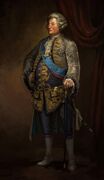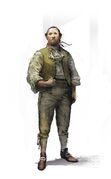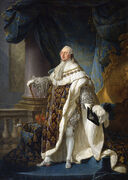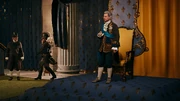No edit summary Tag: sourceedit |
Tag: sourceedit |
||
| Line 15: | Line 15: | ||
===Early life and reign=== |
===Early life and reign=== |
||
====Early life==== |
====Early life==== |
||
| − | Born as the third son of {{Wiki|Louis, Dauphin of France (1729–1765)|Louis, Dauphin of France}} and the grandson of [[Louis XV of France|King Louis XV]], Louis-Auguste was never expected to become king. Instead, his parents attention went to his eldest brother and heir to the throne, {{Wiki|Louis, Duke of Burgundy|Louis, duc de Bourgogne}}. In 1761 however, the 9-year-old heir died of tuberculosis. Louis-Auguste's father died of the same disease four years later, making the former Dauphin at the age of 11. His mother, {{Wiki|Maria Josepha of Saxony, Dauphine of France|Maria Josepha of Saxony}}, never recovered from the shock of losing her eldest son and husband, and died of tuberculosis herself in 1767.<ref name="AE">''[[Assassin's Creed Unity: Abstergo Entertainment - Employee Handbook]]''</ref> |
+ | Born as the third son of {{Wiki|Louis, Dauphin of France (1729–1765)|Louis, Dauphin of France}} and the grandson of [[Louis XV of France|King Louis XV]], Louis-Auguste was never expected to become king. Instead, his parents' attention went to his eldest brother and heir to the throne, {{Wiki|Louis, Duke of Burgundy|Louis, duc de Bourgogne}}. In 1761 however, the 9-year-old heir died of tuberculosis. Louis-Auguste's father died of the same disease four years later, making the former Dauphin at the age of 11. His mother, {{Wiki|Maria Josepha of Saxony, Dauphine of France|Maria Josepha of Saxony}}, never recovered from the shock of losing her eldest son and husband, and died of tuberculosis herself in 1767.<ref name="AE">''[[Assassin's Creed Unity: Abstergo Entertainment - Employee Handbook]]''</ref> |
Having been largely ignored in his childhood, Louis-Auguste appears to have received many of his characteristic traits from his tutors. They taught him that austerity and aloofness were desirable attributes for a king and showed strong character, instead of encouraging him to be decisive and personable.<ref name="AE"/> |
Having been largely ignored in his childhood, Louis-Auguste appears to have received many of his characteristic traits from his tutors. They taught him that austerity and aloofness were desirable attributes for a king and showed strong character, instead of encouraging him to be decisive and personable.<ref name="AE"/> |
||
Revision as of 00:18, 19 December 2015

|
Ezio, my friend! How may I be of service? This article is in desperate need of a revamp. Please improve it in any way necessary in order for it to achieve a higher standard of quality in accordance with our Manual of Style. |
- "Every time I create an appointment, I create a hundred malcontents and one ingrate."
- ―Louis XVI.[src]
Louis XVI of France (born Louis-Auguste de France, duc de Berry; 1754 – 1793) was King of France and Navarre from 1774 until 1791, after which he was subsequently King of the French from 1791 to 1792, before his deposition and execution during the French Revolution.
Biography
Early life and reign
Early life
Born as the third son of Louis, Dauphin of France and the grandson of King Louis XV, Louis-Auguste was never expected to become king. Instead, his parents' attention went to his eldest brother and heir to the throne, Louis, duc de Bourgogne. In 1761 however, the 9-year-old heir died of tuberculosis. Louis-Auguste's father died of the same disease four years later, making the former Dauphin at the age of 11. His mother, Maria Josepha of Saxony, never recovered from the shock of losing her eldest son and husband, and died of tuberculosis herself in 1767.[1]
Having been largely ignored in his childhood, Louis-Auguste appears to have received many of his characteristic traits from his tutors. They taught him that austerity and aloofness were desirable attributes for a king and showed strong character, instead of encouraging him to be decisive and personable.[1]
In May 1770, the 15-year-old Louis-Auguste married his second cousin once removed, the 14-year-old Habsburg Archduchess Maria Antonia, better known as Marie Antoinette, in an arranged marriage.[1] The celebrations of their wedding ended in tragedy when 132 Parisians were killed following a stampede at a fireworks display at the Place Louis XV.[2] The young Archduchess found her marriage to the shy and ineffectual Louis-Auguste unpleasant and lackluster, as their personalities were complete opposites. While he retired to bed before midnight and got up early in the morning, she enjoyed partying and gambling and slept until the afternoon.[1] As such, it would take eight years before the couple conceived the first of four children, much to the derision of the French people.[2]
Early reign
In 1774, Louis XV died, making the twenty-year-old Louis-Auguste King of France. After losing the Seven Years' War, France was facing debt and public discontent with the monarchy.[1] Louis' predecessor had in many ways covered up the nation's problems without solving any of them, while also being considered immoral and debauched, something Louis wished to distance himself from.[2]
Although he had good intentions and wished to do good by his subjects, Louis had little understanding of governance. His shy personality meant that he was unable to defy various aristocratic factions and navigate the complicated politics of a royal court[1] that seemed incapable of reform, which made his reign a highly agitated one.[2] Insecure and indecisive by nature, and possible clinically depressed, Louis did little to effectively counter the problems that would eventually lead to the revolution, even if he had not caused them himself. He would typically avoid addressing problems directly and instead seek refuge in hobbies and passions such as hunting, locksmithing,[1] carpenting, geography and exploration.[2]
In 1776, Louis appointed the Swiss banker Jacques Necker as his finance minister. Necker suggested that he use loans to finance support for the American rebels fighting British colonial authorities in the American Revolutionary War. It was hoped that France would make financial gains from the war, although it would soon lead to further debt and Necker's resignation.[2]
Financial crisis
By 1789, France was virtually bankrupt. The situation was worsened by a trade treaty, known as the Eden Agreement, between Britain and France, which mainly benefited the former. Britain was far ahead of the French technologically and inundated France with their industrial products, ruining French artisans. In this vein, some of the aforementioned products would be used in eventual revolutionary riots.[2]
The Revolution
In summer of 1791, with the French Revolution heating up, Louis secretly fled to supposedly loyal troops in the East.[2]
10 August
On 6 August 1792, a crowd gathered at the Champ de Mars once more to demand the abolition of the monarchy. Fearing attempts to derail the revolution, radical Jacobins and Cordeliers took refuge at the Hôtel de Ville along with 7,000 troops and took over the Paris Commune. In response, Louis strengthened the defences at the Tuileries from 2,000 to 3,000 men, mainly composed of his Swiss Guard. When the grounds of the Tuileries were invaded, Louis took refuge in the National Assembly where he was arrested soon after and stripped of his power, before being sent to the Temple.[2]
Trial
The National Convention's trial of the former king now known as Louis Capet began on 11 December 1792. Louis faced 11 charges, including attempting to prevent the meeting of the Estates-General and liberty by extension, ordering the storage of grain, sugar and coffee, arranging the restoration of the absolutist monarchy with the help of Holy Roman Emperor Leopold II and King Frederick William II of Prussia and suspending the execution of a decree against non-juring priests.[2]
He disputed all of these charges and attempted to present valid arguments, even though he knew that he could do little to prevent a death sentence. Those who testified on Louis' behalf were massacred in two instances, while documents that could have proven his innocence were not passed on to his defenders. As such, the verdict seemed predetermined. Out of the Convention's 721 deputies, 691 voted in favor of a verdict of guilty, while none voted for acquittal. On 15 January 1793, the Convention declared Louis guilty of conspiracy against public freedom.[2]
Over the following two days, deputies debated as to whether he should imprisoned, exiled or executed, and if execution should be immediate or witheld until a politically oppportune time. Thanks to the vote of the Templar Louis-Michel le Peletier, the deposed king was sentenced to immediate execution by a vote of 361 to 360.[2]
Death
- "(People, I die innocent. Gentlemen, I am innocent of everything I have been charged with. My wish and hope is that my blood may consolidate the well-being of the French people.)"
- ―Louis XVI at his execution, 1793.[src]
Louis was scheduled for execution on 21 January. On the morning of his execution, he prayed for salvation inside his cell, before being driven to the Place Louis XV, now known as the Place de la Révolution. As he climbed the guillotine scaffold, Louis pleaded to the crowd that he was innocent, but hoped that France would not suffer for his death. Before he could continue, a drum roll was ordered to silence him. The king was decapitated by the executioner Charles-Henri Sanson moments later, his head being shown to the crowd, who proceeded to sing Ça Ira.[2]
Louis had, in secret, somehow acquired a First Civilization artifact at an unknown date. He later placed the artifact in a small chest and hid it in a secret vault in his private study at Palais des Tuileries. This vault was discovered by Napoleon Bonaparte and the Assassin Arno Dorian in 1792, as both men vied two different things from it – Arno, letters incriminating Mirabeau, and Napoleon, the chest containing the artifact; once Napoleon had retrieved the artifact, he quickly concealed it to prevent Arno from noticing it.[2]
Trivia
- Unity's depiction of Louis' trial differs vastly from actual history, being presented as more of a frame-up, with Louis being blamed for the famine that had been artificially orchestrated by the Templars. In real life, Louis' trial centered on his conspiring with foreign powers and sabotaging the revolutionary movement; even those that wanted to spare his life admitted he was guilty of the charges.
Gallery
References





